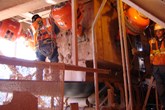Cornish Lithium secures sufficient funding to continue exploration activities in Cornwall
Published by Claire Cuddihy,
Assistant Editor
Global Mining Review,
Cornish Lithium Ltd. has successfully raised a further £1 million from its existing investors. These funds will enable the company to continue its exploration activities in Cornwall (UK) and to drill exploratory boreholes to extract samples of lithium bearing brines from key locations: thus testing the deposit model.
Lithium-bearing brines continue to be the focus of the company, however recent research by the Cornish Lithium team has demonstrated potential for the company to extend its activities to include hard rock sources of lithium and other metals. Cornish Lithium therefore intends to evaluate an integrated approach to both lithium-enriched brines and hard rock projects in Cornwall.
Over the past year, the company has expanded and consolidated the areas over which it has rights to explore for lithium and other minerals.
Furthermore, the Cornish Lithium team has assembled a vast amount of historical data and reconstructed this in 3D digital format, enabling a totally new understanding of the geological potential of Cornwall’s mineral deposits. Such understanding includes delineating many of the various mineral ownership structures in Cornwall that have complicated exploration efforts in the past.
The use of modern digital software has enabled a holistic view of mineral ownership in combination with structural geology, geophysics and historical mining data, creating a powerful tool which enables the company to prioritise areas that are suitable for further investigation. It is important to note that while much of the historical data comes from past mining operations the company is not targeting water in the old mines for lithium extraction. Rather, the company is targeting naturally-circulating lithium-enriched fluids in bedrock which often appeared in historic mines as ‘hot springs’ and which were regarded to be of great scientific interest due to their lithium content. Cornish Lithium intends to drill extraction boreholes in the vicinity of historic mining operations, but to avoid historic mine workings themselves and instead to target permeable geological features which host the lithium-enriched brines. These brines are believed to be derived from the interaction of geothermal waters with lithium-enriched granite deep beneath Cornwall.
Jeremy Wrathall, CEO of Cornish Lithium, commented: “We are delighted to have secured additional funding for our exploration activities in Cornwall from our existing investors. All company directors have also participated in this round of funding. Over the last year we have identified key locations where we intend to drill exploratory boreholes with the intention of confirming lithium concentrations within geothermal brines.”
“We believe that Cornwall has significant potential as a 'lithium province' given the widespread presence of lithium-enriched granites and believe that our large portfolio of mineral rights agreements gives us excellent access to key areas of interest.
“Cornwall also offers great potential to source many of the metals required for batteries that are becoming crucial in modern technologies. Deposits of such metals in Cornwall could become vital sources of key battery metals for the UK economy. The lack of exploration in Cornwall for over 30 years means that one of the most highly mineralised areas in Europe remains effectively untouched by modern exploration techniques."
The company now has a team of eight geologists, two mining engineers and three metallurgists and intends to continue its research and exploration activities in Cornwall during 2019 and beyond.
Read the article online at: https://www.globalminingreview.com/exploration-development/18012019/cornish-lithium-secures-sufficient-funding-to-continue-exploration-activities-in-cornwall/
You might also like
Martin Engineering’s new Australian Managing Director shares industry insights
Martin Engineering has hired Darren Gilbert as Managing Director of its Australian Business unit and released a Q&A in which he shares some of his industry insights and experience.


